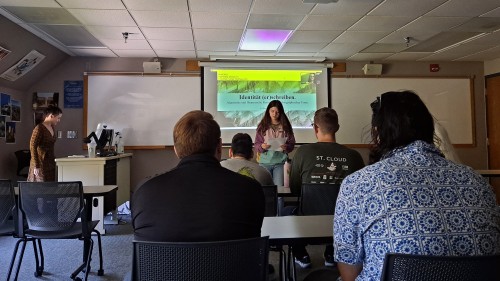While the department of world languages and cultures is helping students achieve Concordia’s mission in their language courses at every level, students in this semester’s German 311: Advanced Composition and Style course are experiencing a special opportunity to do just that by connecting with experts around the world. They’re learning about different genres of writing and how to effectively reach people in whatever format they choose through the Speaker Series, Wie schreibt man...? (How do you write ...?).
Students are being introduced to methods for crafting an appropriate piece of literature for an audience of their choosing, taking into account the applicable register and their scholarly and cultural goals for the piece.
Dr. Rebecca Stewart-Gray, visiting assistant professor of German, has crafted Wie schreibt man...? calling on colleagues, former advisors, and friends with whom she has collaborated across her career to speak with her students. This series spans the semester, with six guest speakers making an appearance in the class over Zoom, each talking about their areas of expertise. Students are able to listen to the speakers’ experiences and strategies for effectively reaching audiences in their respective genres and are then able to ask questions of their own at the end of the lecture. These lectures directly correspond to assignments the students are working with in their course.
Students have spoken with two different experts, the first of whom mentored Stewart-Gray during her M.A. Dr. Jeffrey L. High (California State University, Long Beach), spoke about his recently published biographies on German authors Friedrich Schiller and Heinrich von Kleist, both of whom introduced scholarly volumes. High talked about the nuances of rewriting histories in a new light, especially when the subject is someone as canonical as these two.
The second speaker, Dr. Lorely French (Pacific University in Forest Grove, Ore.), spoke about her devotion to bringing underrepresented female writers’ works to light. She transcribes, translates, and analyzes these women’s notebooks, memoirs, and art, and most recently worked with the notebooks and artworks of Holocaust survivor Ceija Stojka. Stojka’s texts featured in French’s talk were written well after her internment in concentration camps – she was already 50 – but the autobiographical author and poet wrote from the perspective of herself as a child growing up in a camp. Due to the nature of these memoirs, French also focused on the question of memory and the different modes of approaching memory in the autobiographical format.
Additional speakers include Jil Runia, a current doctoral candidate at the Rheinische Friedrich-Wilhelms-Universität Bonn, who discusses the topic of identity through the lenses of Algerian and Lebanese autobiographical/auto fictional novel writers. Dr. Friederike von Schwerin-High (Ponoma College in Claremont, Calif.) will host a creative writers’ workshop in November and will guide the students through the process of writing a short story in German. Dr. Seán Allan (University of St. Andrews in Scotland) will visit in December. He specializes in East German film and will offer a different format for students, who will read one of his published articles prior to the session and then participate in a moderated Q&A session with him regarding writing about film.
Stewart-Gray's goal in creating the Speaker Series was to connect students with excellent pedagogues who can present the students with scholarship that is still student-centered and meaningful to them. She knows that writing can be a daunting task in a person’s native language, so writing in a language that, for most of her students, is a second language, can be extremely intimidating. She wanted to connect students with people who are able to show them examples and give support as they work to master these genres in a curated, guided, and facilitated safe space. Stewart-Gray has crafted the Speaker Series and students’ work to complement each other, with the goal of having students create works in the course that they can use. Students have written biographies and job applications in the course so far, and many of the applications students wrote were for jobs they are interested in applying for, both in the United States and in German-speaking Europe.
This series is an excellent example of Concordia’s emphasis on integrative learning and career readiness. Along with the experience of learning tricks of the trade from these professionals, students are also able to boost their resumes by helping to moderate these discussions. Prior to the speaker’s session, students rehearse introducing the guest to the class and are trained in the art of moderating a discussion. Through this, students are able to learn best practices in moderating, including keeping the sessions subject-centered, time-controlled, and effective – skills that are widely applicable to their futures.
Anyone is welcome to attend the lectures, which all take place during German 311 class times, from 2:40-4:20 p.m. Tuesdays and Thursdays in BW 344. The lectures are in German, so they are a fantastic opportunity to improve existing language ability and to learn something new!
Written by Emma Skuza ’22, World Languages and Cultures administrative assistant
